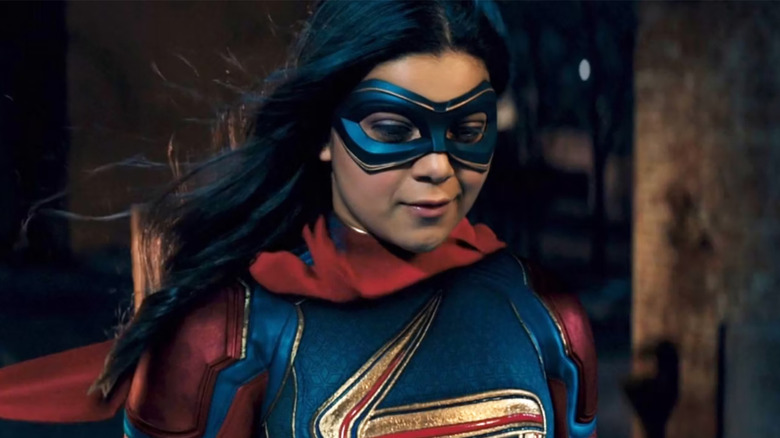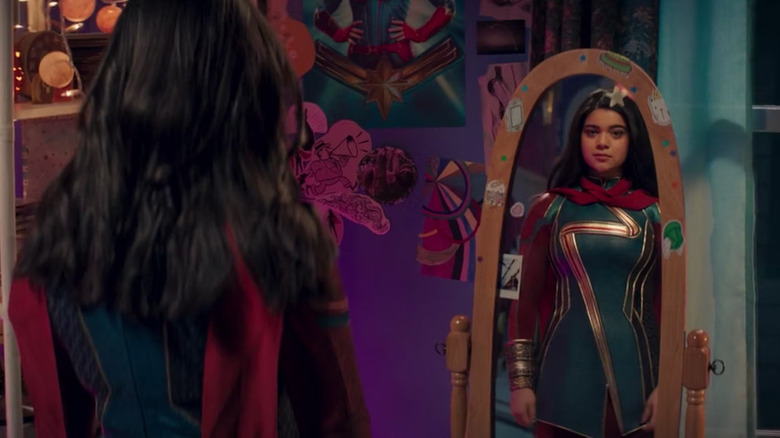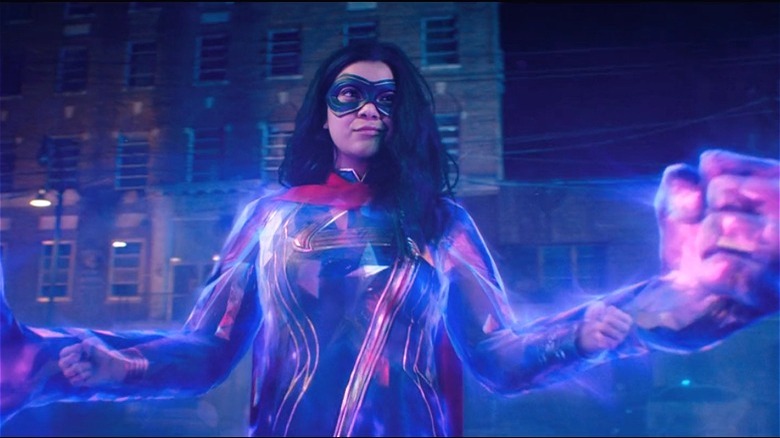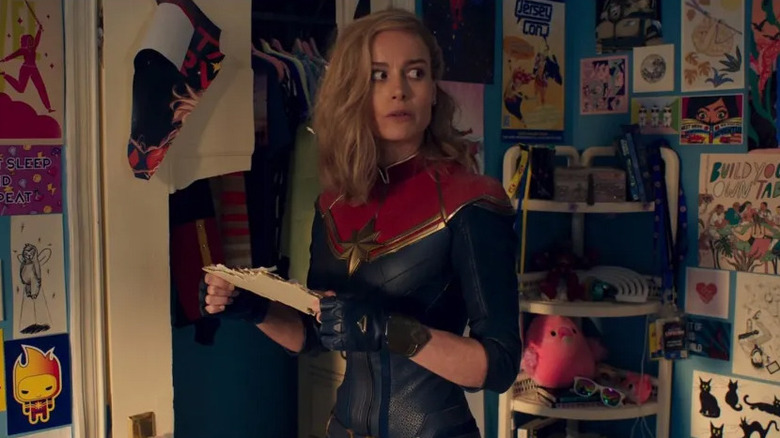Ms. Marvel Season 1 Ending Explained: The Beginning Of A New Era
Warning: Major spoilers ahead for season 1 of "Ms. Marvel."
Bringing the story of Kamala Khan to life in all its vibrant, compelling glory in a TV series format comes with its own set of challenges, especially amid the more diverse projects already populating Phase 4 of the Marvel Cinematic Universe. This task entails establishing Kamala as a distinct character that is true to her cultural and comic roots while weaving a compelling story that connects seamlessly to the rest of the MCU. "Ms. Marvel" series creator Bisha K. Ali succeeds in doing just that and more, creating a charming, eventful entry that raises the bar for representation in groundbreaking ways.
As a South Asian writer, "Ms. Marvel" means a great deal to me — be it the nuanced, expertly-woven Partition story that rarely sees the light of day in mainstream media or the accurate, relatable representation of Kamala's intersectional identities that is so important for many reasons. Season 1 of the show ended on a mostly positive note (it is a YA-centered story, after all) while putting forth an epilogue and a mid-credits scene that deepen and widen the ambit of possibilities for the future of the MCU.
Apart from bringing a satisfying conclusion to this chapter of Kamala's story, "Ms. Marvel" ends on a note that brings home some of the show's running themes, which include the importance of self-acceptance, the support of community, strength in solidarity, and most importantly, what superhero-ing means for a teenager from New Jersey. So let's break down the key parts of the first season finale of "Ms. Marvel."
Kamala embraces her authentic self
Kamala (Iman Vellani) has always been true to her passions: she's an avid Marvel fan (just like Vellani in real-life), a talented sketch artist, and an extremely warm individual. However, the tussle arises when Kamala is presented with the very real possibility of having superpowers, and assuming the responsibilities (and risks) that come with it, all while navigating the concerns of her family, especially her mother Muneeba (Zenobia Shroff).
Episode 6 of "Ms. Marvel" establishes a wholesome arc for both of Kamala's parents — while Muneeba accepts her for who she is and puts her faith in her (even stitching her Ms. Marvel costume for her), her father inadvertently provides her with the superhero moniker while explaining how "Kamala" translates to "marvel" in Urdu. Although concerned for her safety, both of them cheer her on during the big, scary fight with the Department of Damage Control, later reiterating how proud they are of her for standing up for what's right.
Kamala underwent a lot of personal turmoil and confusion while learning the nature of Aisha's (Mehwish Hayat) powers and the true nature of her identity. However, as iterated by Waleed (Farhan Akhtar), the terms "Djinn" or "Clandestine" are merely labels and do not truly sum up who Kalama is, as she is infinitely more. This is what Kamala reaffirms when Bruno (Matt Lintz) tells her about the "mutation" in her genes — while the reveal is huge for the MCU, and for Kamala, it is just another aspect of her contrapuntal identity.
Fighting for what's right (with the ones you love)
When Kamala's father expresses concern for her safety, she says that he didn't raise her to just stand by when people need help. This is at the core of who Kamala Khan is, and she proves that by doing everything in her power to protect Kamran (Rish Shah) and the others during the high-school showdown. Aamir (Saagar Sheikh) steps up too, aiding the teens in their plan, in which they chart out an elaborate setup to stall the special forces on Kamran's heels.
What might have been a turning point in Kamran's story and led to a potential villain arc is thwarted when Kamala tells him the truth about Najma's death, that she sacrificed herself when she closed the Veil of Noor and gave Kamran the last of her powers. Even when Kamran spirals out of control and is very close to potentially hurting the civilians, Kamala bravely intervenes to protect him, giving Kamran the support he needs and allowing him to escape in the process, with the help of Kareem's (Aramis Knight) contact at the harbor.
The power of friendship plays a part here, and while this trope is technically overused and hackneyed by this point, the show utilizes it in a convincing, refreshing way. Kamala takes accountability whenever she messes up, as evidenced in her apology to Nakia (Yasmeen Fletcher) for hiding the truth from her. There's also an endearing sense of solidarity among the community, who come together to rally behind the kids and later hype up Kamala via social media (as they should). This gives Kamala the confidence and affirmation to keep doing what she does best, ushering in a new chapter in her life.
Paving the path for the MCU's future
There were two major reveals in the episode finale — one being that Kamala is, in fact, a mutant, which marks the group's official introduction into the MCU, which has huge implications for the MCU. But there was also a post-credits scene that sees Carol Danvers (Brie Larson) suddenly swap places with Kamala. Danvers' introduction in the show sets up the upcoming "The Marvels," which will see Kamala team up with her idol, alongside Monica Rambeau (Teyonah Parris of "WandaVision"). Both reveals hold a lot of weight in terms of the direction of the MCU, potentially tying to the lores that will be explored hereon, leading to the introduction of characters who will be instrumental for what happens next.
Furthermore, while it is unclear whether "Ms. Marvel" will get a second season, the show might very well return and continue the storylines of these characters. We want to know how Kamran is holding up in Karachi with Kareem, whether Bruno reunites with Kamala and Nakia (what's in that letter he slid into Kamala's locker?), and what's next for Nakia as an empowered individual who intends to usher in a much-needed reform. Although "Ms. Marvel" is thoroughly underappreciated when compared to other MCU shows, such as "Loki" or "Wandavision," I'm hoping that more people will get on board with Kamala's story and derive genuine joy and meaning from it.
Kamala's story is obviously not over, and it will be interesting to delve into her mutant origins, which might set up the X-Men in future MCU projects, paving a whole new direction for the MCU. "Ms. Marvel" remains a vibrant entry into the MCU, spearheading characters worth rooting for within a structure that champions thoughtful, meaningful representation that will hopefully be further embraced in the near future.



